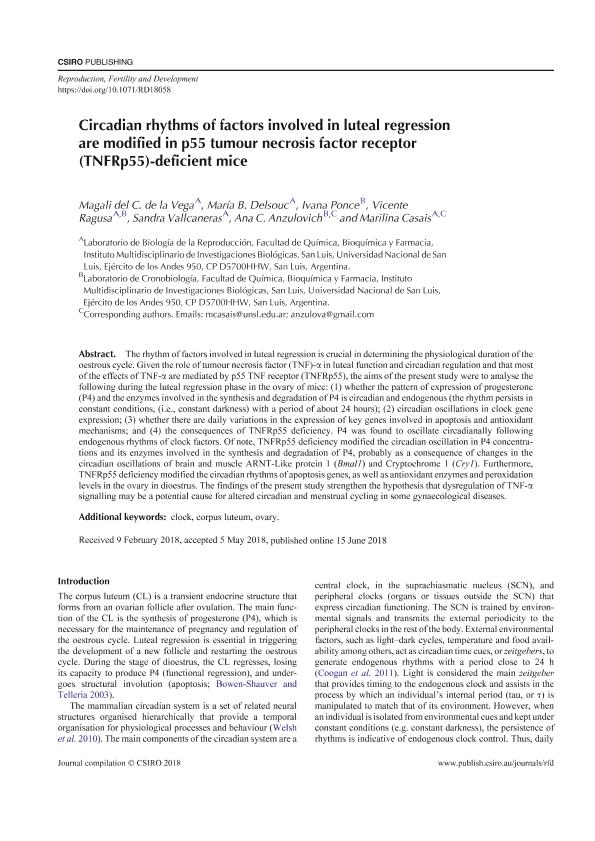Artículo
Circadian rhythms of factors involved in luteal regression are modified in p55 tumour necrosis factor receptor (TNFRp55)-deficient mice
de la Vega, Magali del Carmen ; Delsouc, María Belén
; Delsouc, María Belén ; Ponce, Ivana Tamara; Ragusa, Juan Antonio Vicente
; Ponce, Ivana Tamara; Ragusa, Juan Antonio Vicente ; Vallcaneras, Sandra
; Vallcaneras, Sandra ; Anzulovich Miranda, Ana Cecilia
; Anzulovich Miranda, Ana Cecilia ; Casais, Marilina
; Casais, Marilina
 ; Delsouc, María Belén
; Delsouc, María Belén ; Ponce, Ivana Tamara; Ragusa, Juan Antonio Vicente
; Ponce, Ivana Tamara; Ragusa, Juan Antonio Vicente ; Vallcaneras, Sandra
; Vallcaneras, Sandra ; Anzulovich Miranda, Ana Cecilia
; Anzulovich Miranda, Ana Cecilia ; Casais, Marilina
; Casais, Marilina
Fecha de publicación:
05/2018
Editorial:
Csiro Publishing
Revista:
Reproduction Fertility and Development
ISSN:
1031-3613
Idioma:
Inglés
Tipo de recurso:
Artículo publicado
Clasificación temática:
Resumen
The rhythm of factors involved in luteal regression is crucial in determining the physiological duration of the oestrous cycle. Given the role of tumour necrosis factor (TNF)-α in luteal function and circadian regulation and that most of the effects of TNF-α are mediated by p55 TNF receptor (TNFRp55), the aims of the present study were to analyse the following during the luteal regression phase in the ovary of mice: (1) whether the pattern of expression of progesterone (P4) and the enzymes involved in the synthesis and degradation of P4 is circadian and endogenous (the rhythm persists in constant conditions, (i.e., constant darkness) with a period of about 24 hours); (2) circadian oscillations in clock gene expression; (3) whether there are daily variations in the expression of key genes involved in apoptosis and antioxidant mechanisms; and (4) the consequences of TNFRp55 deficiency. P4 was found to oscillate circadianally following endogenous rhythms of clock factors. Of note, TNFRp55 deficiency modified the circadian oscillation in P4 concentrations and its enzymes involved in the synthesis and degradation of P4, probably as a consequence of changes in the circadian oscillations of brain and muscle ARNT-Like protein 1 (Bmal1) and Cryptochrome 1 (Cry1). Furthermore, TNFRp55 deficiency modified the circadian rhythms of apoptosis genes, as well as antioxidant enzymes and peroxidation levels in the ovary in dioestrus. The findings of the present study strengthen the hypothesis that dysregulation of TNF-α signalling may be a potential cause for altered circadian and menstrual cycling in some gynaecological diseases.
Palabras clave:
CLOCK
,
OVARY
,
CORPUS LUTEUM
,
TUMOR NECROSIS FACTOR
Archivos asociados
Licencia
Identificadores
Colecciones
Articulos(IMIBIO-SL)
Articulos de INST. MULTIDICIPLINARIO DE INV. BIO. DE SAN LUIS
Articulos de INST. MULTIDICIPLINARIO DE INV. BIO. DE SAN LUIS
Citación
de la Vega, Magali del Carmen; Delsouc, María Belén; Ponce, Ivana Tamara; Ragusa, Juan Antonio Vicente; Vallcaneras, Sandra; et al.; Circadian rhythms of factors involved in luteal regression are modified in p55 tumour necrosis factor receptor (TNFRp55)-deficient mice; Csiro Publishing; Reproduction Fertility and Development; 30; 12; 5-2018; 1651-1665
Compartir
Altmétricas



